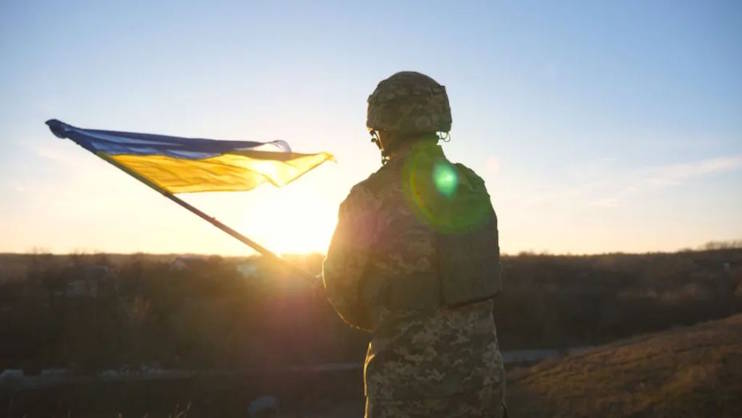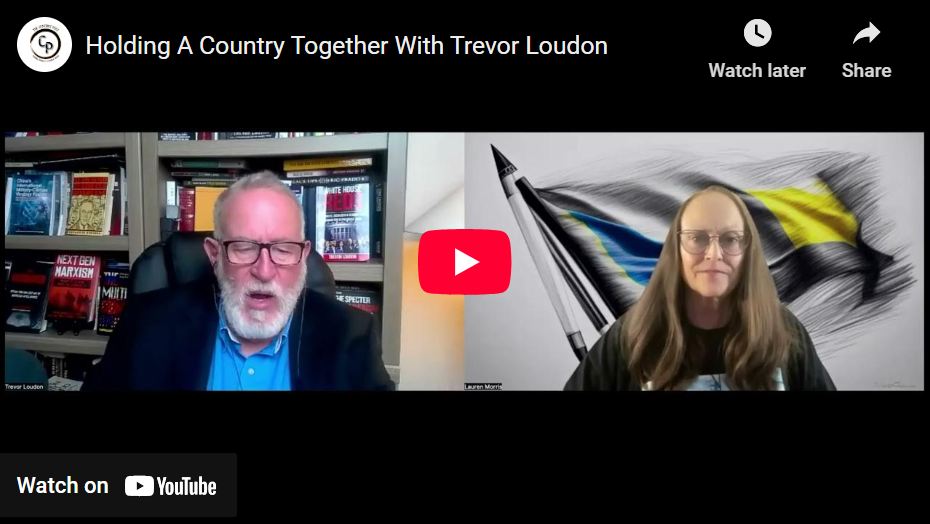
The Russian Invasion of Ukraine: A Discussion on Ideological Threats and Global Stakes
By Lauren Comele Morris
In a recent episode of The Centrist Post, host Lauren Comele Morris engaged in a compelling dialogue with Trevor Loudon. The conversation, which centered on the Russian invasion of Ukraine, offered a sobering perspective on the ideological underpinnings of global conflicts and the urgent need for Western resolve. Loudon’s insights, drawn from decades of studying communist and Islamist influences, framed the Ukraine conflict as a critical battleground in a broader struggle for freedom.
The Roots of Loudon’s Research
Loudon began by recounting his early exposure to communist subversion in the 1980s, when he learned of Soviet efforts to destabilize New Zealand’s military alliance with the United States, known as ANZUS. He described how Soviet-trained operatives infiltrated New Zealand’s socialist movements, manipulating public sentiment to push an anti-nuclear policy that effectively dismantled the alliance. This experience shaped his understanding of how small, ideologically driven groups can influence larger societal structures-unions, political parties, and social movements-to advance their agendas. Loudon sees similar tactics at play in modern global politics, including Russia’s actions in Ukraine.
Putin’s Ideological Ambitions
The discussion turned to Vladimir Putin’s motivations, which Loudon attributes to a blend of Marxism-Leninism and Eurasianism-an ideology envisioning Russia as the center of a vast empire encompassing Eastern Europe, Central Asia, and beyond. He referenced a 2050 conference document from Moscow, presided over by Foreign Minister Sergey Lavrov, which explicitly outlined Russia’s intent to reclaim a sphere of influence across multiple continents. Loudon argued that this ambition is not merely about territorial expansion but about reshaping global power dynamics by dismantling Western alliances like NATO. He warned that Russia’s military buildup in Belarus, including low-trajectory ICBMs and hundreds of thousands of troops, signals a potential invasion of Poland or other NATO countries, possibly as early as August or September 2025.
Zelenskyy: A Hero for the Ages
Morris and Loudon expressed deep admiration for Ukrainian President Volodymyr Zelenskyy, whom they view as a heroic figure standing firm against Russian aggression. They dismissed accusations of corruption against him as baseless propaganda, emphasizing his courage in rejecting personal safety for the sake of his nation. Loudon recounted Zelenskyy’s famous response when offered evacuation: “I don’t want a ride, I want bullets.” Comparing Zelenskyy’s leadership to Winston Churchill’s during World War II, Loudon predicted that history will remember him as a defining figure of the 21st century if the West supports Ukraine to victory. Morris shared her emotional connection to the Ukrainian cause, noting the visible pain on Zelenskyy’s face during a recent NATO conference and praising his resilience in the face of unimaginable pressure.
The U.S. Leadership Challenge
The conversation also addressed the challenges facing U.S. leadership, particularly President Donald Trump’s approach to Russia. Loudon suggested that Trump’s business-oriented mindset leads him to view Putin as a negotiable figure, akin to a tough mob boss, rather than an ideologue driven by a vision of historical destiny. He criticized the influence of pro-Russian figures in Trump’s circle, such as Tulsi Gabbard, Tucker Carlson, and Steve Bannon, who advocate for a conciliatory approach toward Russia. Loudon argued that this perspective underestimates Putin’s long-term goals and risks leaving the U.S. unprepared for Russian aggression. He urged Trump to align with NATO allies, capitalize on their increased defense spending-partly spurred by his own policies-and take a firm stand against Russia to secure a legacy akin to Ronald Reagan’s defeat of the Soviet Union.
A Call for Western Resolve
Loudon and Morris emphasized the stakes of the Ukraine conflict, framing it as a pivotal moment for the West. Loudon proposed a “positive domino effect”: defeating Russia in Ukraine and imposing severe economic sanctions could destabilize Putin’s regime, weaken Iran’s support for Russia, and pressure the Chinese Communist Party, potentially leading to a freer world. He warned that failure to support Ukraine could lead to Russia’s expansion into Europe, fulfilling Putin’s imperial ambitions and triggering a broader conflict. Morris echoed this call for empathy and action, decrying the dehumanization of Ukrainians through propaganda and urging Americans to reject complacency.
Conclusion: A Legacy at Stake
The discussion concluded with a reflection on the broader mission to preserve freedom. Loudon praised Zelenskyy’s leadership and Ukraine’s fight as a frontline defense against tyranny, alongside struggles in America and Israel. He highlighted his KeyWiki database (keywiki.org), which documents the connections of political figures to communist and Islamist networks, as a tool for understanding these threats. Morris commended Loudon’s work for enhancing public awareness and stressed the need for continued vigilance. Together, they underscored that the outcome of the Ukraine conflict will shape not only the future of Europe but also the legacy of Western leaders in confronting ideological extremism.
Published with permission of trevorloudon.com
